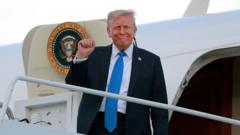Friedrich Merz's ambition to become Chancellor of Germany faces unexpected turmoil as he falls short of necessary votes during the first round of parliamentary voting. With mounting challenges on both domestic and foreign fronts, the outcome raises doubts about his leadership capabilities.
Friedrich Merz Faces Political Hurdle as Chancellor Bid Falters

Friedrich Merz Faces Political Hurdle as Chancellor Bid Falters
A significant setback for Friedrich Merz marks an uncertain future for Germany's political landscape following his failure to secure strong parliamentary support.
In a surprising turn of events, Friedrich Merz, leader of Germany's Christian Democrats, encountered a significant setback in his quest to become the country's next Chancellor. Following national elections in February, Merz was expected to be sworn in on Tuesday; however, he fell short in the initial parliamentary vote, requiring a second chance set for the same afternoon.
Merz's initial bid ended with him just six votes shy of the required majority of 316, marking a historic failure as no candidate has ever missed the first-round vote in Germany's modern history. In a secret ballot, 307 lawmakers opposed him, while nine abstained, indicating possible dissent within his own coalition, which includes the Social Democrats.
The ramifications of this outcome were swiftly reflected on the stock market, leading to a decline in German stocks and sparking concerns among economists about his proposed economic revitalization strategies. The inability to form a stable government comes at a precarious time, with Germany facing numerous challenges, including a struggling economy and increased geopolitical tensions.
Merz's leadership faced scrutiny for prior missteps, including a controversial immigration policy that invited protests and opposition from within parliamentary ranks. The outcome of the imminent second vote remains pivotal, as it could either reinstate confidence in his leadership or signify deeper fractures within German politics.
As global eyes turn towards Berlin, the potential for Merz's agenda regarding economic and political reforms hangs in a delicate balance, with both national and international implications at stake. Lawmakers will need to navigate these challenges carefully if they hope to facilitate a successful transition of power in the coming days.




















